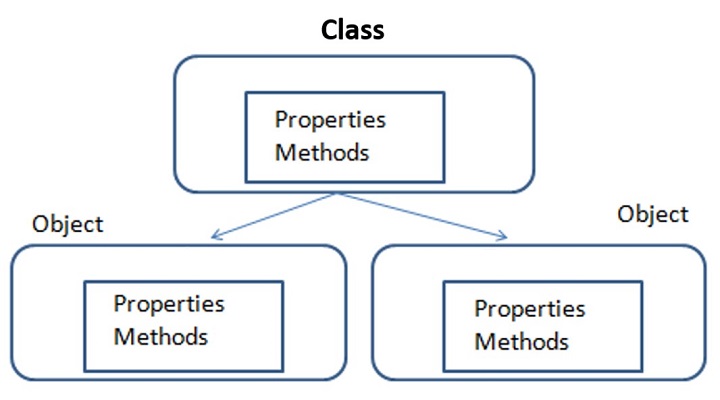The concept of classes and objects is central to PHP’s object-oriented programming methodology. A class is the template description of its objects. It includes the properties and functions that process the properties. An object is the instance of its class. It is characterized by the properties and functions defined in the class.

Defining a Class in PHP
To define a class, PHP has a keyword “class“. Similarly, PHP provides the keyword “new” to declare an object of any given class.
The general form for defining a new class in PHP is as follows −
<?php
class phpClass {
var $var1;
var $var2 = "constant string";
function myfunc ($arg1, $arg2) {
[..]
}
[..]
}
?>The keyword class is followed by the name of the class that you want to define. Class name follows the same naming conventions as used for a PHP variable. It is followed by a pair of braces enclosing any number of variable declarations (properties) and function definitions.
Variable declarations start with another reserved keyword var, which is followed by a conventional $variable name; they may also have an initial assignment to a constant value.
Function definitions look much like standalone PHP functions but are local to the class and will be used to set and access object data. Functions inside a class are also called methods.
Example
Here is an example which defines a class of Book type −
classBook{/* Member variables */var$price;var$title;/* Member functions */functionsetPrice($par){$this->price=$par;}functiongetPrice(){echo$this->price."<br/>";}functionsetTitle($par){$this->title=$par;}functiongetTitle(){echo$this->title." <br/>";}}The pseudo-variable $this is available when a method is called from within an object context. $this refers to the calling object.
The Book class has two member variables (or properties) – $title and $price. The member variables (also sometimes called instance variables) usually have different values for each object; like each book has a title and price different from the other.
The Book class has functions (functions defined inside the class are called methods) setTitle() and setPrice(). These functions are called with reference to an object and a parameter, used to set the value of title and price member variables respectively.
The Book class also has getTitle() and getPrice() methods. When called, they return the title and price of the object whose reference is passed.
Once a class is defined, you can declare one or more objects, using new operator.
$b1=newBook;$b2=newBook;The new operator allocates the memory required for the member variables and methods of each object. Here we have created two objects and these objects are independent of each other and they will have their existence separately.
Each object has access to its member variables and methods with the “->” operator. For example, the $title property of b1 object is “$b1->title” and to call setTitle() method, use the “$b1->setTitle()” statement.
To set the title and price of b1 object,
$b1->setTitle("PHP Programming");$b1->setPrice(450);Similarly, the following statements fetch the title and price of b1 book −
echo$b1->getPrice();echo$b1->getTitle();Example
Given below is the complete PHP script that defines Book class, declares two objects and calls the member functions.
<?php
class Book {
/* Member variables */
var $price;
var $title;
/* Member functions */
function setPrice($par){
$this->price = $par;
}
function getPrice(){
echo $this->price ."\n";
}
function setTitle($par){
$this->title = $par;
}
function getTitle(){
echo $this->title ."\n";
}
}
$b1 = new Book;
$b2 =new Book;
$b1->setTitle("PHP Programming");
$b1->setPrice(450);
$b2->setTitle("PHP Fundamentals");
$b2->setPrice(275);
$b1->getTitle();
$b1->getPrice();
$b2->getTitle();
$b2->getPrice();
?>It will produce the following output −
PHP Programming
450
PHP Fundamentals
275
Leave a Reply